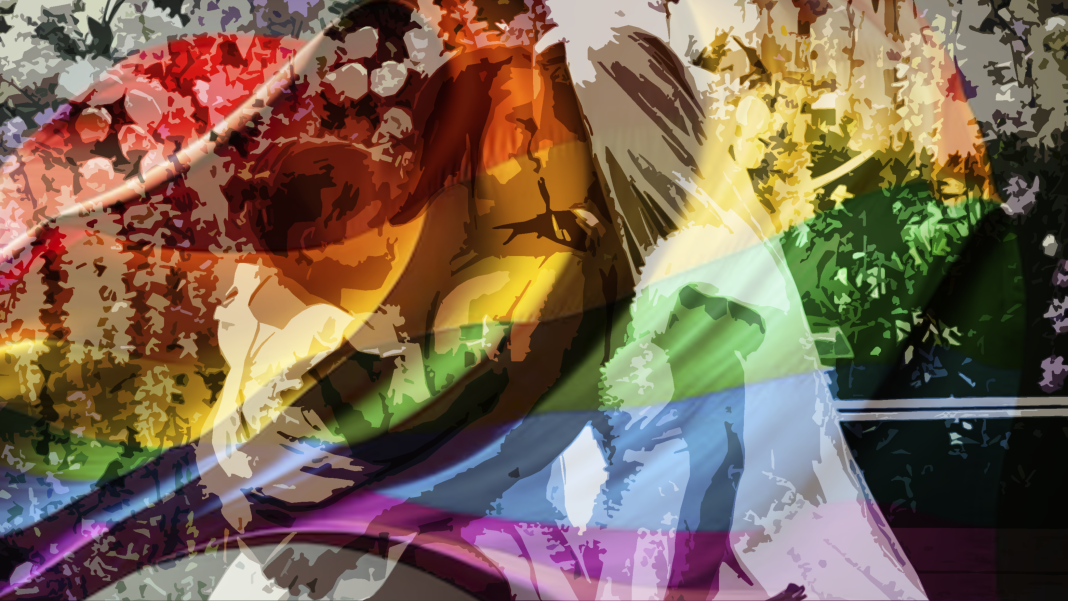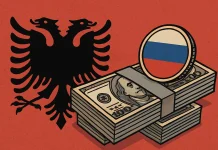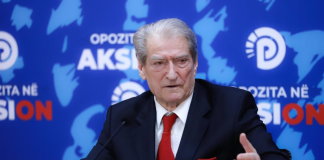By Ben Andoni
Even 10 days later (May 19), after the two Albanian women celebrated their cohabitation with a marriage ceremony on the terrace of the Tirana Municipality, articles and television programs about this event have not ceased. The ceremony, conducted by two British pastors in the presence of 80 guests, was a full-fledged event. The couple was accompanied by their two 3-year-old daughters, twins born via in vitro fertilization.
The presence of the girls heightened the controversy, as protests in Albania over the Surrogacy Law and debates about family have continued all week.
Despite Albanian law not allowing same-sex marriages, partners Edlira Mara and Alba Ahmetaj submitted a request to the civil registry to be married after 14 years of love. Regarding the use of the terrace for the wedding ceremony, Alba Ahmeti stated, as quoted by the media (Telegraf, 2024), that they initially applied in Edlira’s name and the request was approved. Nonetheless, the most logical argument was that every taxpayer has the right to use the municipal terrace.
Is this the beginning of such a procedure to legalize same-sex marriages?!
It seems that other stories await the Albanian media. ‘It made noise, but that wasn’t the intention. The intention was to show everyone that being LGBT and a believer is more than legitimate. It wasn’t according to Albanian laws, but according to the word of God. Love is the word of God. Even weddings without a formal celebration are typical in Albania,” expressed Alba Ahmetaj, one of the protagonists.
And the choice of the officiator was strategic Andy Fitchet was selected. He is the widely-discussed cleric who, after marrying a woman with whom he has a son, admitted some time ago that he didn’t feel fulfilled and publicly declared that he was gay, which led to his expulsion from the Church and his transition to Methodist Church services. ‘I am a pastor in Britain and manage two churches. I am accredited by the Baptist Union of England and authorized by the Methodist Church’ he stated. ‘I am a Christian and an LGBT person, and I believe you can be both simultaneously without needing to choose,’ echoed another pastor (Report, 2024).
In reality, it’s not so simple, and better than anyone else, the members of the Albanian LGBT community know this. It seems the ceremony is the first attempt to go much further, in fact, to do what many countries have done, which means legitimizing through a cause. However, this did not resonate widely in the Albanian media.
The truth is that there is a reform within this church. The General Conference of the United Methodist Church in Charlotte, North Carolina (April 23 – May 3, 2024) took steps to remove all language from the Book of Discipline that restricts or singles out non-heterosexual people for different treatment (Edward, 2024)[1].
All this does mean that United Methodist clerics are now free to officiate same-sex marriage ceremonies when they are considered legal, and equally free not to do so when they shouldn’t (Ibid). However, in Albania, while the media has turned it into a common debate that ranks high in clicks, the Catholic clergy has not clarified this position of the Methodist Church.
The problem seems to lie with the procedures. ‘The first step was presenting the request in civil status, the second step is that my partner and I will seek the same thing. After receiving a negative response, we will go to court and then take the case to the Strasbourg Court to follow the example of Greece, Italy, and many other countries,” said Xheni Karaj, a well-known activist from the LGBT community, when asked by media.
The Municipality has carefully avoided granting venues for the ceremony, but the Civil Status Directorate declared that no marriage certificate was registered in the Civil Registry for two individuals of the same gender. Meanwhile, the Civil Status confirmed again that there was no marriage between two same-sex women. The fact is that same-sex marriage is not provided for in the Family Code, and the Municipality, in this case, should have been more careful. On the other hand, because of the legislation on which it operates for local self-government, Law 139/2015 cannot preempt the Family Code, according to the law.
The media has called the reaction of religion in our country hypocritical, linking the involvement of clerics in the activities of Mayor Veliaj, as well as what they have found objectionable against the Mayor of Tirana. In fact, the Catholic Church condemned the first marriage between two women in the Municipality of Tirana and even dismissed the fact that its clerics had the mandate to officiate marriages. The Catholic Church stated that marriage between persons of the same gender is unacceptable and categorically prohibited according to its doctrine. Spokesperson Dom Mark Pashkja confirmed that the Catholic Church’s stance against same-sex marriage remains unwavering.
The Muslim community, through a media statement, urged the Municipality of Tirana to ‘be careful about such events’ and added that ‘developing such a procedure in contradiction to Albanian law and the Family Code of the Republic of Albania is a dangerous act to legalize and normalize a process that seeks to be imposed unwillingly through the destruction of family and our national culture.’
Anastas Janullatosi, from the Orthodox Church, has remained distant, but he has at least made an appeal through his structures regarding this act.
Based on recent developments, it appears that the act by the religious community on August 19, 2009, is now a distant memory. On that day, former Prime Minister Berisha announced a new anti-discrimination law, granting legal recognition and protection to the rights of LGBTI individuals in the country. At the time, the clergy sent a letter to the government expressing their concern, considering the expansion of family rights for LGBT people a threat to the Albanian family and society. They viewed homosexuality as an imported habit from Western countries and urged the then Prime Minister to ‘do what is right in the eyes of God and not what is right in the eyes of the modern world.’
The main issue identified in media reporting has been the cacophony of voices and the lack of reasoned discussion regarding the community’s legal status. Television debates have predominantly featured religious representatives and LGBT advocates, while online written media has often published striking and somewhat stigmatizing articles about them. It is clear that there has been no shortage of panegyrics and moralists, as well as individuals who thrive on media turmoil.
The debate escalated during the last opposition protest, two days after a celebration in front of the municipality. Actor Mehdi Malkja voiced his concerns about the same-sex marriage that was blessed on May 19 on the municipality’s terrace. His message resonated with some citizens, who subsequently threw Molotov cocktails at the Institution’s main door.
The paradox lies in the fact that politicians have turned this situation into a political spectacle, becoming almost comical as they fail to realize that they themselves have paved the way for LGBT rights. Recently, the Democratic Party, while discussing ‘Surrogacy’, has reiterated family values, insisting they are a conservative party (despite being Center-Right) and opposing such official acts. Meanwhile, the Socialist Party has been more cautious. Under their leadership, LGBT activities have flourished, and the annual Gay Parade in Tirana has included both local and international participants.
The LGBT community in Albania faces social challenges, but it must be noted that they are increasingly liberated in their activities year by year. Political contributions to the legal framework have been significant (albeit often driven by European obligations), and the media continues to exploit community events for online clicks without addressing the real issues affecting this community and the progress of legal procedures.
LGBT individuals in Albania are protected by comprehensive anti-discrimination legislation. Since 1995, same-sex sexual activities for both males and females have been legal in Albania. The country has ratified Protocol No. 12 of the European Convention on the Protection of Human Rights and Fundamental Freedoms and was a signatory to the UN Declaration of 2007 on Sexual Orientation and Gender Identity. During the era of the People’s Socialist Republic of Albania’s constitution, same-sex sexual activity was criminalized, resulting not only in severe prison sentences, but bullying, and social isolation.
Moreover, Article 137 of the Crimes Against Social Morality in the Penal Code stated: The acts of pederasts are punishable by up to 10 years of imprisonment. The term ‘pederast’ was used as a code for sexual relations between two people of the same gender or between an adult and a minor, regardless of the minor’s gender. Albania somewhat regulated its legal framework in 1994, when it proposed a draft law in the Penal Code where homosexuality would remain illegal but with a reduced legal penalty of three years, down from the previous ten years of imprisonment.
The campaign led by the ‘Gay Albania Society’ within Albania, as well as continuous pressure from international organizations like ILGA, in which the Council of Europe played a significant role, led to the withdrawal of this draft law. On January 20, 1995, the Albanian parliament legalized sexual activity between people of the same gender, abolishing the infamous Article 137 of the old Penal Code.
Could Albania today resemble Hungary?
It is unlikely with the socialist government of Mr. Rama, which is highly compliant with the EU. The European Commission took Hungary to the European Court of Justice late last year to change the law restricting access to information on LGBTQ issues. The proposed legal changes prohibit the ‘display and promotion of homosexuality’ to individuals under 18. The ban applies to discussions and dissemination of information in schools that the authorities deem to promote homosexuality and gender change. The ban also applies to advertisements, prohibiting those targeting persons under 18 if seen as showing solidarity with homosexuals.
Originating in Russia as a campaign, it spread to Hungary and is likely to reach Romania. Hungarian Prime Minister Viktor Orban said that von der Leyen’s remarks about the law were ‘shameful’ and based on lies. Romania is considering a draft law that would prevent minors from being exposed to so-called ‘homosexual propaganda’ in schools and public life, despite warnings from rights groups that it would ‘fuel Russian propaganda campaigns and disinformation’ and restore censorship in the former communist country. For its part, Orban’s government, which prides itself on promoting a Christian-conservative agenda and family values, has increased its enforcement.
In Albania, there is no predisposition for such laws. However, the opposition, represented by former Prime Minister Berisha and former President Meta, has recently warned that the country could become a ‘womb farm’ or ‘uterus factory’ if the proposed government law regulating surrogacy is approved, following a hardline stance emerging in Europe. Even though these statements indicate a shift towards conservative right-wing values for these two parties, they have often shown the ability to position themselves outside their ideological axis. The problem remains in the narrative built and the confusion of the family issue, which the opposition takes up as a cause whenever the majority advances its EU agendas.
The petition initiated by ‘Pro Family and Life,’ signed by citizens seeking to ban surrogacy in Albania, stop pregnancy termination at 16 weeks without parental knowledge, and sterilize girls and boys aged 18 to 23, will be sent to the Albanian Parliament and the President of the Republic.
Meanwhile, the Law on Sexual and Reproductive Health continues to be consulted. The Deputy Minister of Health clarifies that surrogacy will be allowed only between relatives and insists that the law is still in draft form, with some points subject to review.
Today, on June 1st, an organized march by the Coalition ‘Pro Family and Life’, involving parents, children, and grandparents, aims to not only oppose recent legislative proposals such as same-sex marriage and gender identity recognition, but also to advocate for several MORATORIUMS on legal changes. These changes would allow for same-gender marriages and adoption of children by LGBTQIA+ individuals. Preventing legal changes that facilitate the recognition and identification of genders beyond the binary (male, female), and banning organizations and entities that directly or indirectly promote LGBTQ agendas and propaganda from operating in pre-university and pre-school educational institutions for children and adolescents. Additionally, prohibiting the incorporation of issues related to sexual orientation, sexualization, and gender identity into school and pre-school programs for children and adolescents.
It seems that the organization of the LGBT community, culminating recently with the marriage of two women, is likely to follow its typical course to Strasbourg and may very well become obligatory for Albania and its legal framework. However, this ongoing debate, now crucial to include procedural and societal readiness, is marred by widespread prejudice and a shallow understanding of the realities faced by LGBTQ individuals—a situation we cannot avoid, given the obligations that politics has committed to fulfill. As evidence continues to mount, the lack of substantial discussion on surrogacy and the health of Albanian families has sparked recent protests against Albania’s new surrogacy law.
[1] https://www.umc.org/en/content/ask-the-umc-what-is-the-churchs-position-on-homosexuality










